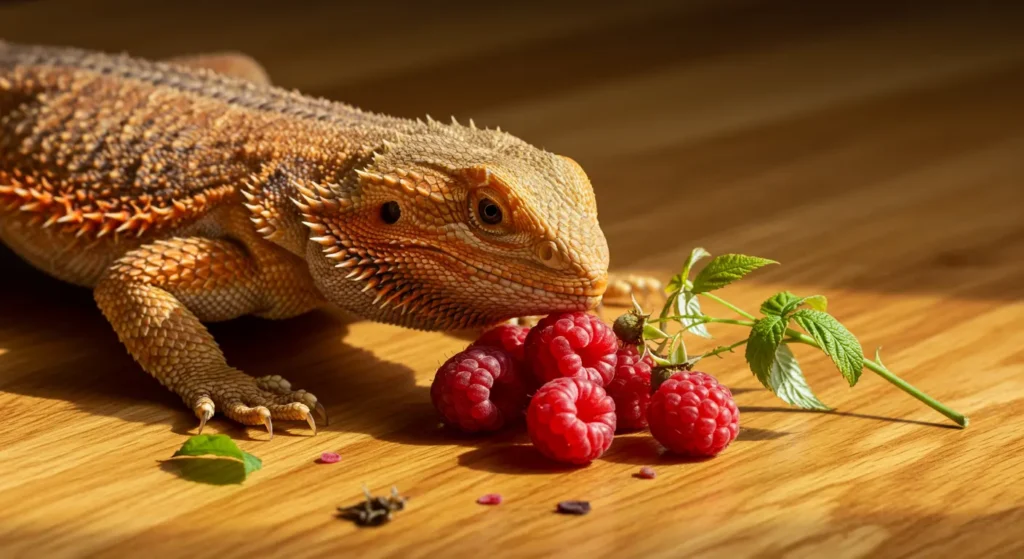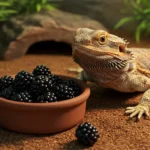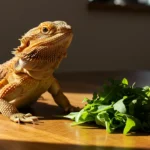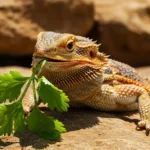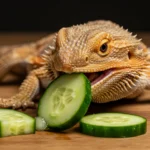If you’re a bearded dragon owner, you might wonder: can bearded dragons have raspberries? Many owners ask this because raspberries are sweet, colorful, and nutritious—but are they safe for your pet? Knowing whether bearded dragons can have raspberries helps you keep your reptile healthy and happy.
This guide explains the benefits of raspberries, shows how to feed them safely, and highlights the risks of overfeeding. By the end, you’ll know exactly how to include this tasty fruit in your bearded dragon’s diet. If you’ve been asking yourself can bearded dragons have raspberries, keep reading for expert tips and practical advice.
Can Bearded Dragons Have Raspberries? Understanding Their Diet Needs
Bearded dragons have specific dietary requirements that combine vegetables, insects, and occasional fruits. Understanding what treats are safe ensures your pet stays healthy. Raspberries are popular among owners, but knowing how they fit into a beardie’s diet is essential.
Are Raspberries Safe for Bearded Dragons as Fruit Treats?
Raspberries are considered safe fruits for bearded dragons when fed in moderation. These small, soft berries make excellent beardie treats because they are easy to chew and digest. Unlike citrus or avocado, which can irritate the digestive system, raspberries are reptile-friendly fruits. Always wash them thoroughly to remove pesticides or residues. Fresh or thawed frozen raspberries work best, and you should avoid canned or sweetened varieties. Treats like raspberries should complement a balanced diet of leafy greens and insects. Offering them occasionally helps prevent excessive sugar intake while still providing variety in texture and flavor. For even more fruit options, you might also explore kiwi, another colorful and safe treat for your beardie. Introducing small portions at first allows you to monitor your beardie’s tolerance. Overall, raspberries can safely become part of a varied diet, providing a sweet, nutritious snack without harming your pet.
Health Benefits of Raspberries for Bearded Dragons
Raspberries offer significant nutritional value for bearded dragons. They are rich in vitamins such as vitamin C, vitamin K, and vitamin E, which support immune function and skin health. These berries also contain fiber, which aids digestion and maintains healthy gut function. Minerals like manganese and potassium contribute to strong bones and muscle function. The antioxidants in raspberries help reduce inflammation and support overall well-being. Including raspberries in your beardie’s diet can also add variety, encouraging natural foraging behavior. Because they are low in calories and water-rich, raspberries make a healthy treat without causing obesity. Balanced feeding of these fruit treats alongside vegetables and protein sources ensures your bearded dragon receives essential nutrients without overloading its system.
How Often Should Bearded Dragons Eat Raspberries?
Bearded dragons should enjoy raspberries occasionally rather than daily. A safe portion size is typically a few small berries for juvenile dragons and slightly more for adults. Overfeeding fruit can increase sugar intake and disrupt the calcium-phosphorus balance, which is essential for bone health. Fruit treats should make up no more than 10–15% of the total diet, with vegetables and insects forming the bulk. Offering raspberries once or twice a week allows your beardie to enjoy variety while maintaining a balanced diet. Always observe how your dragon reacts to new foods and adjust portion sizes accordingly. By controlling feeding frequency, you provide a healthy, enjoyable treat without compromising long-term nutrition.
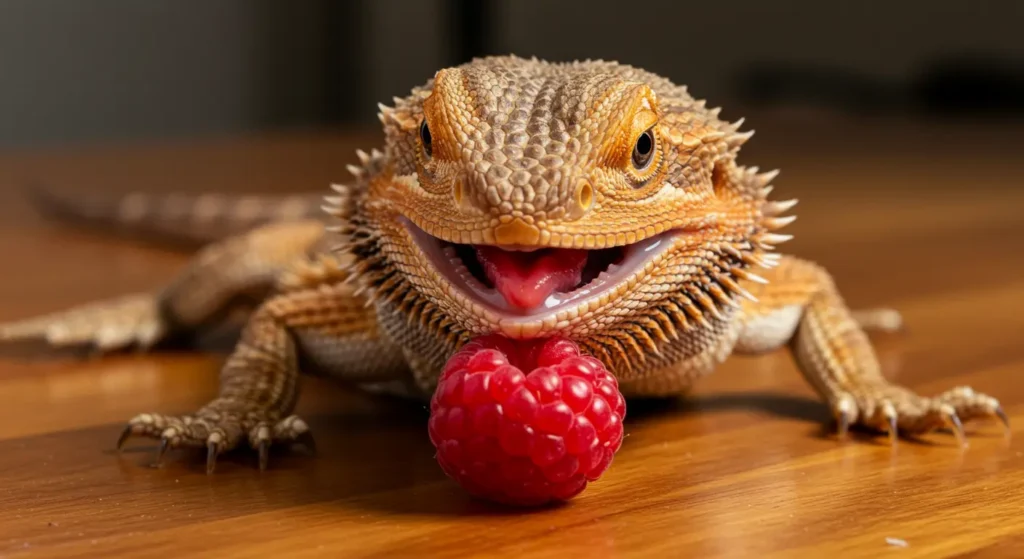
Nutritional Value of Raspberries for Bearded Dragons’ Health
Raspberries are not only tasty but also packed with nutrients that support a bearded dragon’s overall health. Understanding their vitamin, mineral, and hydration content helps you make informed feeding decisions.
Essential Vitamins in Raspberries for Beardies
Raspberries contain several vitamins that benefit bearded dragons. Vitamin C boosts immune function and aids in wound healing, while vitamin K supports proper blood clotting. Vitamin E functions as a powerful antioxidant, protecting cells from damage. These vitamins also contribute to healthy skin and scales, enhancing your beardie’s appearance. Providing raspberries alongside a diet rich in leafy greens and calcium-supplemented insects ensures your pet receives the right balance of nutrients. While fruits should not replace vegetables, raspberries can enhance vitamin intake without overwhelming the digestive system. Their natural sweetness encourages your beardie to explore new textures and flavors, supporting mental stimulation and healthy feeding habits.
Minerals and Fiber in Raspberries to Support Digestion
Raspberries offer valuable minerals like iron, magnesium, and potassium, which are essential for bone strength, muscle function, and overall vitality. The fiber in raspberries promotes healthy gut function and prevents constipation. Fiber also slows sugar absorption, reducing the risk of blood sugar spikes from occasional fruit treats. Feeding raspberries in moderation provides these benefits while maintaining digestive balance. Pairing fruit with calcium-rich vegetables ensures proper nutrient ratios for optimal health. Bearded dragons enjoy the soft texture of raspberries, which encourages chewing and supports jaw development. Overall, raspberries contribute both essential minerals and digestive support, making them a smart addition to a varied diet.
Hydration Benefits of Feeding Raspberries
Raspberries are water-rich fruits that help maintain hydration in bearded dragons. Many beardies do not drink enough water directly, so offering moist fruits can increase fluid intake. Proper hydration aids kidney function, digestion, and overall metabolism. Including raspberries as an occasional treat ensures your pet receives extra water while enjoying a tasty snack. Fresh or thawed berries provide the best hydration benefits, as canned or sugar-laden alternatives may be harmful. Combining raspberries with other vegetables and fruit creates variety and encourages natural foraging behaviors. Regularly offering hydrating fruits like raspberries can complement your watering routine, helping your bearded dragon stay healthy, energetic, and properly hydrated.
How to Feed Raspberries Safely to Your Bearded Dragon
Feeding raspberries safely ensures your bearded dragon enjoys a healthy treat without digestive issues. Proper preparation, portion control, and pairing with other foods make fruit treats both enjoyable and beneficial.
Preparing Raspberries for Your Beardie
Before offering raspberries, wash them thoroughly to remove pesticides and contaminants. Rinse under cool water and gently pat dry. For frozen raspberries, allow them to thaw completely at room temperature or in the fridge. Avoid using warm water or microwaving, as it can damage nutrients. Small, bite-sized pieces are ideal for easier consumption and digestion. Cutting larger berries prevents choking and encourages natural chewing behavior. Fresh raspberries are best, but properly thawed frozen berries retain most of their nutrients and fiber. Always inspect each berry for mold or spoilage before serving. Careful preparation ensures your beardie receives a safe, tasty, and nutritious fruit treat that complements their regular diet.
Portion Sizes and Treat Guidelines for Bearded Dragons
Offering the right portion size is essential when feeding raspberries. Juvenile bearded dragons benefit from a few small berries, while adults can have slightly larger servings. Fruit should make up no more than 10–15% of the total diet to prevent excessive sugar intake. Overfeeding can lead to digestive problems or nutrient imbalances. Always monitor how your beardie reacts to new treats and adjust accordingly. Introducing fruit gradually allows you to identify preferences and tolerance. Treats should supplement, not replace, vegetables and protein sources. Following portion guidelines helps maintain a balanced diet, ensuring your bearded dragon enjoys raspberries safely without compromising overall health.
Combining Raspberries with Other Foods for a Balanced Diet
Pairing raspberries with leafy greens or insects enhances nutritional balance. Mixing fruit with vegetables ensures your beardie receives fiber, vitamins, and minerals without excessive sugar. Offering fruit alongside protein, such as crickets or mealworms, supports healthy growth and energy levels. You can also mash raspberries slightly to sprinkle over salads, encouraging natural foraging behavior. Variety in texture and color stimulates appetite and provides mental enrichment. Remember, fruit complements rather than replaces core dietary items. Balanced combinations promote overall health, proper digestion, and optimal nutrient absorption while keeping your bearded dragon engaged and satisfied.
Common Mistakes to Avoid When Feeding Raspberries
Avoid overfeeding fruit, as excessive sugar can lead to obesity and digestive problems. Do not give jam, sweetened berries, or processed fruit, which may harm your beardie. Serving whole, unwashed berries or ignoring portion sizes can also cause health issues. Introducing new foods too quickly may trigger digestive upset or refusal. Monitor your beardie’s reaction and adjust accordingly. Stick to occasional treats and maintain a balanced diet with vegetables and insects. Awareness of these common mistakes ensures your bearded dragon enjoys raspberries safely, supporting both long-term health and enjoyment.
Risks and Best Practices for a Healthy Bearded Dragon Diet
Understanding dietary risks and best practices helps maintain a bearded dragon’s health. Avoiding harmful foods and balancing nutrients prevents long-term problems.
Sugar Content and Obesity Risks in Fruit
High sugar content in fruit can contribute to obesity and metabolic issues in bearded dragons. Limiting sweet treats like raspberries ensures a healthy diet. Fruit should make up only a small portion of the overall feeding plan. Overfeeding sugary foods may lead to weight gain, lethargy, and digestive imbalances. Monitoring fruit intake and providing primarily vegetables and protein helps prevent these risks. Hydrating, water-rich fruits like raspberries are preferable in moderation. Keeping fruit portions controlled supports healthy growth, active behavior, and long-term wellness.
Maintaining Calcium-Phosphorus Balance for Strong Bones
Calcium-phosphorus balance is essential for bearded dragons’ skeletal health. Too much fruit, which contains phosphorus, can disrupt this ratio and weaken bones. Offering calcium-rich vegetables and supplementing insects ensures proper absorption. Balanced nutrition promotes strong bones, proper growth, and overall vitality. Always provide cuttlebone or calcium powder for additional support. Managing fruit treats, including raspberries, while prioritizing calcium-rich foods protects your beardie from metabolic bone disease.
Fruits and Foods Bearded Dragons Should Avoid
Some fruits and foods can be toxic or harmful to bearded dragons. Avoid citrus, avocado, rhubarb, and high-oxalate vegetables. These can irritate the digestive tract, interfere with calcium absorption, or cause toxicity. Always research new foods and introduce them gradually. Observing your beardie’s response helps identify any sensitivity. Offering safe fruits like raspberries in moderation prevents dietary issues. Being cautious with unsafe foods ensures a healthy, balanced diet and reduces long-term health risks.
Tips for a Balanced Diet and Long-Term Beardie Health
A healthy diet includes a mix of leafy greens, protein-rich insects, and occasional fruits. Variety ensures your bearded dragon receives essential vitamins, minerals, and fiber. Monitor feeding frequency, portion sizes, and hydration. Rotate vegetables and protein sources to prevent nutrient gaps. Include safe fruits like raspberries occasionally to add taste and enrichment. Regularly observing your beardie’s weight, activity, and appetite ensures proper nutrition. Combining these practices supports long-term health, optimal growth, and a happy, active pet.
Conclusion: Ensuring a Safe and Balanced Diet for Your Bearded Dragon
Raspberries can be a tasty and nutritious treat for your bearded dragon when fed correctly. Understanding how to prepare them, controlling portion sizes, and pairing them with other healthy foods ensures your beardie enjoys the benefits without risks. Moderation is key—fruit should complement, not replace, vegetables and protein.
Regularly monitoring your bearded dragon’s diet helps prevent obesity, digestive issues, and nutrient imbalances. By including safe fruits like raspberries alongside leafy greens and insects, you can provide a varied and enriching diet that supports growth, energy, and long-term health. Avoid common mistakes, such as overfeeding or serving processed sweet treats, to maintain a healthy and happy beardie.
In short, can bearded dragons have raspberries? Yes—but only as an occasional, carefully prepared treat within a balanced diet. Following proper feeding guidelines ensures your pet thrives while enjoying the natural flavors of fruit. With mindful care, raspberries become a safe, enjoyable addition to your bearded dragon’s meal plan.

